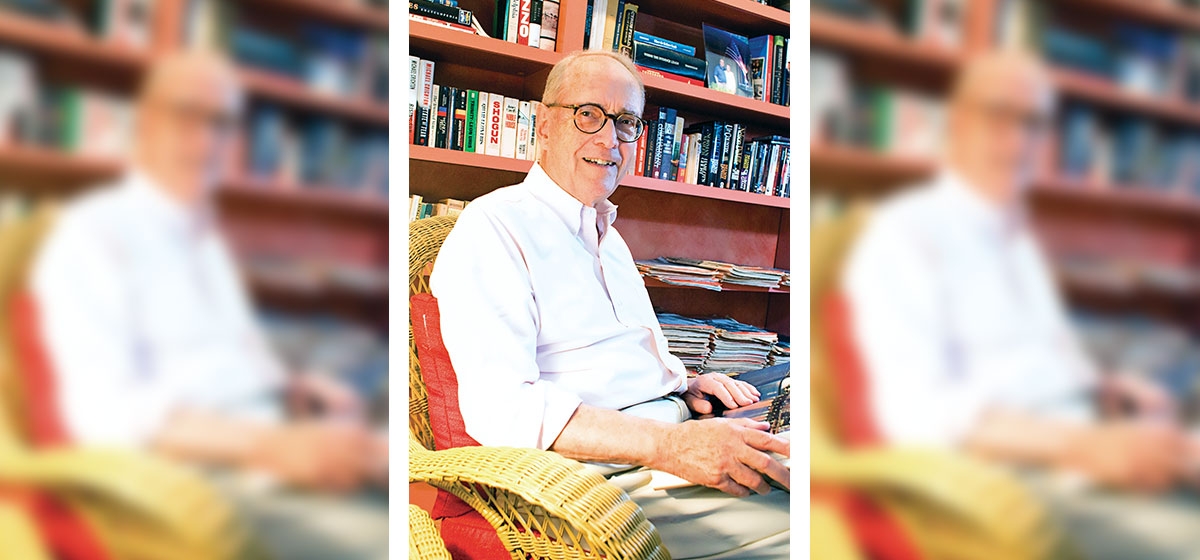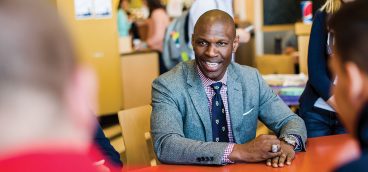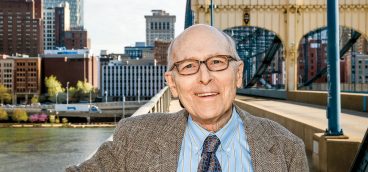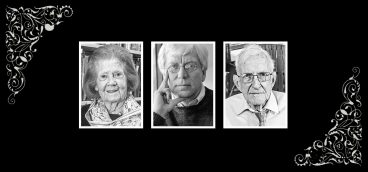Dick Thornburgh, Lawyer and Politician

I’ve had three distinct phases of my career—from public prosecutor to elected official to Washington lawyer—and, strangely, they all came about serendipitously. I grew up in Pittsburgh and went to Yale as an engineering student, even though I was not really suited for it.
A number of my family members were engineers, so I explored the field more or less by default. But I profited tremendously from going to that great university. I met amazing and gifted people. I made good friends. And I got exposed to a lot of possibilities for my life. In my senior year, I took a course called Business Law for Engineers and thought, “Now this is something I may want to pursue.” Not long after, I visited a friend who was a student at Harvard Law School and sat in on one of his classes. Then, just before I graduated, I took the LSAT and was admitted to Pitt Law School. I was hooked. The law was definitely for me.
My father passed away while I was in college, so my mother supported me through law school. Afterward, I worked for a couple of years in the legal department at ALCOA. Then, in 1959, I took a job with what is now K&L Gates. By that time, my wife and I had three boys and things were looking pretty rosy for us. On July 1, 1960, however, my whole world was turned upside-down. My wife was killed in an auto accident and my youngest son, Peter, aged four months, was seriously injured with multiple skull fractures and extensive brain damage. The accident changed my entire outlook. At 28, I learned how fragile life can be and how limited our time is to do something useful with it.
During the 1960s, like many people, I suppose, I became less and less involved in my law practice and more and more inclined toward public service—especially civil rights and civil liberties—particularly when it came to legal services for the average guy. We’re a government of laws, but that isn’t worth much to people if they don’t have proper legal advice in conducting their affairs. I took particular pride in advancing their cause. Eventually I drifted toward politics.
Meanwhile, after three years as a single parent, I was blessed to meet a 23-year-old schoolteacher who was willing to take on an instant family. My wife, Ginny, and I married in 1963, and, in ’66 we had a fourth son, the same year as my unsuccessful run for Congress. Over time, however, I continued to be involved in politics and community-based activities. I was a delegate to the Constitutional Convention in 1967-68 and then was appointed U.S. Attorney in Pittsburgh in 1969. This was another game-changer for me because I had no background in criminal law and had never tried a case in my life! But I felt I had the skills to do it, and it proved to be a very positive change for me.
During the first trial term, I went from courtroom to courtroom watching my assistants try cases, to learn the mechanics of the trade. Where do you stand in the courtroom? How do you put a piece of paper into evidence? Finally, having watched enough and talked enough about it, I began to try some cases on my own. And by the time I left that office, I had become a pretty good trial lawyer. As a result, I was asked to go to Washington to serve in the Justice Department of the Ford administration in the immediate post-Watergate era, which was a most challenging time. That ended my first career as a public prosecutor.
After Gerald Ford lost the presidency to Jimmy Carter, I came back to Pittsburgh and looked into running for office. I had found public service to be fulfilling. By that time, I had prosecuted a lot of corruption cases and had seen the dark underside of government in Pennsylvania. So I chose to run for governor to try to help improve the political environment. We had a vigorous seven-man Republican primary in 1978, which I won, mainly because I was the only candidate from western Pennsylvania. All the others had to split the eastern vote. Then I had the job of running against former Pittsburgh Mayor Pete Flaherty in the general election. Pete was an old friend and a very good, very popular politician. Our first poll showed me 32 points behind him—not very encouraging. But we ran a very good campaign and Pete ran a rather poor one, which made the difference. I won by a couple hundred-thousand votes.
After the election, we had little time to celebrate. Pennsylvania was not in good shape back then. Our manufacturing base had deteriorated and we had turned into a typical Rust-Belt state. Unemployment was high—reaching 14 percent in ’81 and ’82. Then one morning in March of 1979, after presenting our first bare-bones budget, I was hosting a breakfast for freshmen democrats in the legislature at the Governor’s residence when I received a call from our emergency management agency. An accident had occurred at the Three Mile Island nuclear plant.
I’d been in office only 72 days when the Three Mile Island incident took place, and it absorbed huge amounts of time and energy. My main task was to get command of the facts to see what our response should be. Initially, Bill Scranton, my lieutenant governor, had a press conference and reported that the utility had advised us that the systems had worked and there was no danger. Well, they flat-out lied. So I said, “Bill, you have to go out there and tell the reporters the truth; that we’re going to keep trying to find out what the facts are as quickly as we can. We’re not going to delude people with wishful thinking.” That made an impression on people. It isn’t often that an official of any kind admits that what he reported initially turned out to be inaccurate.
In essence, the whole event was over pretty quickly, but we didn’t know that at the outset. We learned that a valve got stuck open, and that caused the amount of cooling water to decrease, uncovering fuel rods in the core. Eventually, they got around to shutting the valve and restarting the flow of cooling water, but that left contaminants in the water and in the air and, frankly, nobody quite knew what the consequences of that were going to be. In retrospect, it appears that the danger of a real catastrophe was not all that high. But the levels of uncertainty and confusion went through the roof.
Consider the following as an example: A couple of days into the scare, a Department of Energy helicopter team went out to take air samples and got very high contamination readings. They reported their findings to Washington and to the Nuclear Regulatory Commission (NRC). What they didn’t say was that those samples had been taken directly above the stacks where the contaminants were coming out. The NRC got the impression that the readings had been taken off-site so they thought, “Holy Smokes! This is really serious! Get those people to evacuate!” We had 250,000 people in the immediate area. When you start evacuating that number of people under stress—the elderly, babies in incubators, reckless drivers, you name it—you’re going to have some real damage. Washington called our emergency management director and told him to evacuate the vicinity. But I was the only person who could order an evacuation, and I said “We’re not going to do anything until we know more about this.” And, of course, they checked into it and concluded that an evacuation was unnecessary. But I shudder to think how close we came to doing something that would have been totally counterproductive and potentially harmful.
What occurred at Three Mile Island had never happened before on the face of the earth, so nobody had any textbooks to pull down for reference. I called President Carter and asked, “Could you send somebody up here to help us make sense out of all of this?” So he sent Harold Denton from the NRC, a perfect choice. Harold was an easy-going North Carolinian with a southern drawl, the requisite technical knowledge, and sterling credibility. He was the real hero of Three Mile Island. He truly helped us turn things around. The accident occurred early on a Wednesday morning, and Thursday and Friday were nearly out of control. We finally welcomed Harold late Friday afternoon and, by the time President Carter came up on Sunday and toured the facility, things had calmed down a great deal.
My reward for having survived Three Mile Island was to get back to the drawing board to figure out what we were going to do about Pennsylvania’s economy and the state’s finances. We really had to work at that over eight years, and I think we did a pretty good job. We cut the tax rates for individuals and for businesses. We reduced the state’s debt and cut 15,000 unnecessary jobs out of the bureaucracy. There wasn’t much pizzazz in our administration, but we had a lot of good people and were able to make it work. That ended my second career. And I felt it was truly an honor to have been the governor of my home state.
After that, I went back to the Department of Justice as attorney general in the administration of George H. W. Bush. That service was truly fulfilling for me. My proudest accomplishment in that role was the passage of the Americans With Disabilities Act. Having a son with a serious disability—as a result of that car crash so many years ago—I was provided with one of those rare opportunities to merge my personal agenda with my official one.
Now I’m in phase three of my career. I’m a Washington lawyer. I’ve been at that for 16 years as a troubleshooter for K&L Gates and its clients, and have been involved in a lot of interesting cases. I was the examiner in the infamous WorldCom case and helped to unravel that mess. The question in a lot of these corporate corruption cases isn’t whether or not we have sufficient laws on the books, but rather, do we have the resolve to enforce them? We have, in fact, probably, too many laws. Some don’t make any sense at all. I broke my pick years ago trying to get a true Federal Criminal Code enacted and I haven’t totally given up on that. But it’s hard to get anybody in Congress interested. They seek easy answers to often complicated questions.
In all phases of my career, I’ve had help and support from many wonderful people. I’ll cite two here for the record: Elsie Hillman and George H. W. Bush.
I owe a lot to Elsie. After the 1964 election when Barry Goldwater got beaten so badly by Lyndon Johnson, which took a terrible toll on the Republican Party across the country, she was the one who encouraged me and a lot of other younger people to get involved in politics. She was the one who recommended me for the job as the U.S. attorney in Pittsburgh. And she’s supported every single thing I’ve done along the way. Elsie is a truly wise and great lady.
And then there’s President George H. W. Bush. I recall one day in New England being raked over the coals by reporters on some issue regarding the Department of Justice. President Bush called me and said, “I know you’re in New England. How about joining us for dinner at my favorite Chinese restaurant?” You see, there had been a rumor circulating that I was going to be replaced as attorney general. “We’ll put that to rest,” he said. “We’ll alert the reporters about our dinner plans.” And sure enough, the next day in the Washington papers, there we were, dining together. The rumor was quashed and I could breathe again. It was a really classy move.
All in all, I’ve been blessed with opportunities and challenges the likes of which I never could have dreamed. As a result, life, for me, has been a truly fascinating and rewarding experience.






